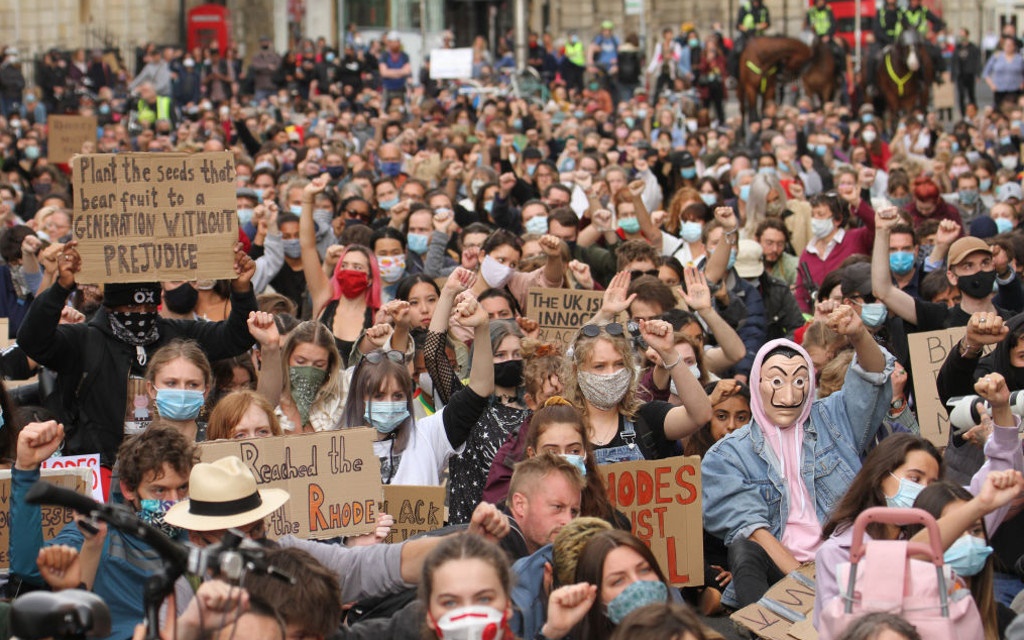
Global protests sparked by the killing of George Floyd are pushing the UK to acknowledge past links to slavery and racism.
In the space of less than 24 hours, insurance marketplace Lloyd’s of London, insurer Aviva, and pub company Greene King apologised for their connection to the slave trade in the 18th and 19th centuries, while a college at Oxford University recommended the removal of a statue of colonialist Cecil Rhodes after years of criticism.
Britain has been confronting some of its most brutal and shameful history after marches by Black Lives Matter throughout the country. The BLM movement has particular resonance in the UK, with its track record of colonizing swaths of Africa and the Caribbean and its central role in the global slave trade.
Lloyd’s of London said Wednesday that it would offer unspecified financial support for charities and organisations promoting inclusion and it would also step up efforts to hire more Black and racially diverse talent.
Greene King, owned by billionaire Li Ka-shing’s real-estate company CK Asset Holdings, said it was inexcusable that one of its founders profited from slavery and argued against its abolition in the 1800s. Benjamin Greene was one of 47 000 people that received compensation from the government for their slave-related assets when the institution was abolished in 1833, the Telegraph reported.
Greene surrendered three plantations in the West Indies and received the equivalent of 500 000 pounds ($622 000) in today’s money, the paper said.
The pub firm will make a "substantial investment to benefit the BAME community and support our race diversity in the business as we increase our focus on targeted work in this area," Chief Executive Officer Nick Mackenzie said in a statement, referring to a British acronym for Black, Asian and minority ethnic communities. Greene King will invest in its own diversity and inclusion work, as well as with charity partners.
The insurer and the pub company are far from alone.
University College London’s Legacies of British Slave-ownership Project has identified 1 201 individuals that left behind some slave-related commercial legacy. That includes docks and canals, insurance companies and banks, according to Katie Donington, a historian at London South Bank University who participated in the UCL project.
While it’s “impossible” to put a figure on total revenues from slave-related industries, Britain would not have the wealth and development that it has today without its history of empire and slavery, Donington said.
Insurance giant Aviva said it was likely that an earlier incarnation of the firm insured people or property that enabled the slave trade.
"Given our long heritage, there have been decisions, actions and behaviours made by our predecessors that are clearly unacceptable to us today," Aviva said in a statement. "Acknowledging this happened and the legacy it has left is important."
The governors of Oxford’s Oriel College voted on Wednesday to recommend removing the statue of Rhodes, one of Britain’s leading imperialists. He made a fortune after pushing the empire to seize South Africa’s diamond mines in the 19th century and co-founded De Beers, which became the dominant producer of the gems. He was a major benefactor of Oriel, which established the Rhodes Scholarship in his name.
Rhodes Must Fall
The campaign to remove the statue - as the University of Cape Town did, in 2015 - has been underway for years, but the global outrage over the killing of Floyd by police in Minneapolis energised the effort. Earlier this month, protesters in Bristol toppled a statue of the slave trader Edward Colston during an anti-racist demonstration and dumped it in the English city’s harbor.
By the mid-18th century, just three decades after Colston’s death, Britain controlled the lion’s share of the slave trade. The profits from colonialism fueled the Industrial Revolution and funded great civic buildings across the UK, with cities raising statues to their benefactors.




 Publications
Publications
 Partners
Partners











